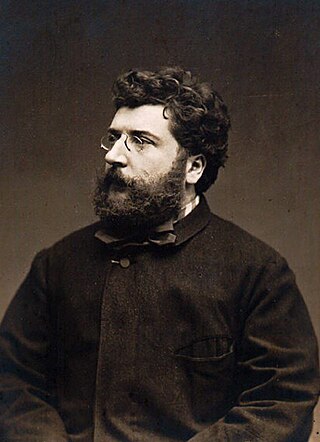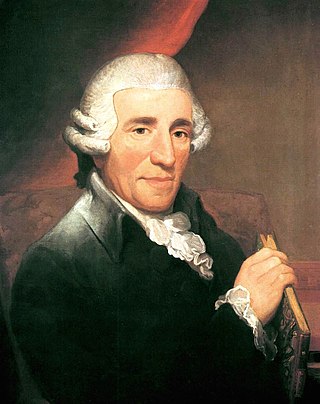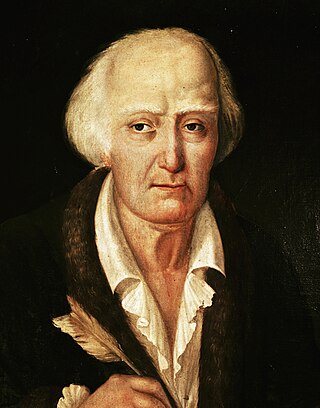| Don Procopio | |
|---|---|
| Opera buffa by Georges Bizet | |
 Bizet in 1875 | |
| Librettist | |
| Language | Italian |
Don Procopio is a two-act opera buffa by Georges Bizet with an Italian libretto completed in 1859, and first performed in 1906.
| Don Procopio | |
|---|---|
| Opera buffa by Georges Bizet | |
 Bizet in 1875 | |
| Librettist | |
| Language | Italian |
Don Procopio is a two-act opera buffa by Georges Bizet with an Italian libretto completed in 1859, and first performed in 1906.
Bizet spent 1857 to 1860 in Italy as winner of the Prix de Rome. Looking for inspiration for a work to send home, he found the subject for his opera buffa in a second-hand bookstall in Rome, writing home that the piece by Carlo Cambiaggio (1798–1880) was "an Italian farce in the manner of Don Pasquale ". The words were a reduced version of I pretendenti delusi (1811) by Giuseppe Mosca (1772–1839). [1]
Composition was sporadic over the winter of 1858–59; Bizet confessed that he was still trying to find his voice, although he intentionally aimed at an Italian style for this piece. The report from the Prix de Rome judges noted advances, but a later report signed by Ambroise Thomas criticised Bizet for sending an opéra bouffe as his first envoi and suggested he divert his attention away from this toward sacred music (although Bizet failed to submit a religious envoi of any sort from Rome). [2]

There are three printed scores of Don Procopio, a vocal score published in 1905 before the premiere, a full score and a second vocal score, all of which are misleading by failing to distinguish genuine Bizet from fake (entr'acte and recitatives). The second and third scores contain two airs for Don Procopio adapted from Bizet's songs; additional instruments were added to the scoring. The autograph score of Don Procopio was discovered in the papers left by Daniel Auber at his death in 1871 and it was acquired from the Auber family by the Paris Conservatoire in 1894. [3]
The first production, in the revised edition by Charles Malherbe, was at the Salle Garnier in Monte Carlo on 10 March 1906, in a double-bill with Pagliacci . There were performances in Barcelona in 1907 and Rome in 1908. The original version was performed at the Théatre Municipal in Strasbourg on 6 February 1958. Lost and Found Opera presented the Australian premiere in June 2016 in Balcatta, Perth. [4] Opera South (UK) presented what they believed was Bizet's pure composition at Charterhouse School in Godalming, Surrey, England, in October 2016. [5]
A recording in Russian, conducted by Vladimir Yesipov, was issued by Melodiya in 1962. The opera has been broadcast (in Italian) by the BBC, and in 1975 by French Radio.
| Role | Voice type | Premiere cast, 10 March 1906 [6] Conductor: Léon Jehin |
|---|---|---|
| Don Procopio | bass | Jean Périer |
| Bettina | soprano | Angèle Pornot |
| Odoardo | tenor | Charles Rousselière |
| Ernesto | baritone | Maximilien-Nicolas Bouvet |
| Don Andronico | baritone | Victor Chalmin |
| Donna Eufemia | soprano | Jane Morlet |
| Pasquino | baritone | Paolo Ananian |
The plot is almost identical to Don Pasquale by Donizetti. Don Andronico, an old miser, wants to marry his niece Bettina to another miser, Don Procopio, because he is worried that a young man will spend all her money. Bettina is however in love with Colonel Odoardo. Assisted by her aunt Eusebia and brother Ernesto, she plans to thwart the old men. Procopio is terrified that Bettina appears to be a grasping spendthrift, and tries to get out of the marriage. When she insists that he do so, he abandons the contract and flees, and Andronico consents to the union of the young lovers. [7]
The music is a brilliant, youthful work, free of the influence of Bizet's teacher Charles Gounod; it is a vital and sparkling imitation of Don Pasquale. The familiar idiom is infused with original touches of harmony, orchestration and melodic turn. [8] The ensembles are particularly successful in using all the stock devices of opera buffa: voices in thirds, staccato chord accompanying and repetition of words. Ernesto's "Non v'e signor" is an exact parallel of Malatesta's "Bella siccome un angelo" – in both, the baritone describes his sister's charms to the old man, in D-flat.
Bizet used several episodes in later works:
while the March in act 1 is taken from the finale of his Symphony in C of 1855.

Georges Bizet was a French composer of the Romantic era. Best known for his operas in a career cut short by his early death, Bizet achieved few successes before his final work, Carmen, which has become one of the most popular and frequently performed works in the entire opera repertoire.

Alfredo Kraus Trujillo was a distinguished Spanish tenor from the Canary islands, particularly known for the artistry he brought to opera's bel canto roles. He was also considered an outstanding interpreter of the title role in Massenet's opera Werther, and especially of its famous aria, "Pourquoi me réveiller?"

La canterina, Hob. XXVIII/2, is a short, two-act opera buffa by Joseph Haydn, the first one he wrote for Prince Esterhazy. Based on the intermezzo from the third act of Niccolò Piccinni's opera L'Origille (1760), it lasts about 50 minutes. It was written in 1766, and was premiered in the summer of that year.

La jolie fille de Perth is an opera in four acts by Georges Bizet (1838–1875), from a libretto by Jules-Henri Vernoy de Saint-Georges and Jules Adenis, after the 1828 novel The Fair Maid of Perth by Sir Walter Scott. Many writers have reserved severe criticism for the librettists for their stock devices and improbable events, while praising Bizet's advance on his earlier operas in construction of set pieces and his striking melodic and instrumental ideas.

Le Cheval de bronze is an opéra comique by the French composer Daniel Auber, first performed on 23 March 1835 by the Opéra-Comique at the Salle de la Bourse in Paris. The libretto is by Auber's regular collaborator, Eugène Scribe and the piece was a great success in its day. In 1857, it was transformed into an opera-ballet, but this did not hold the stage. The overture is one of Auber's most popular. The first-act finale expands on the final phrases from the first-act finale of Mozart's Così fan tutte. The composer tried to reflect the Chinese setting of the story in the music.

La fiera di Venezia is a three-act opera buffa, described as a commedia per musica, by Antonio Salieri, set to an Italian libretto by Giovanni Gastone Boccherini.

Gli equivoci, is an Italian opera buffa by Stephen Storace to a libretto by Lorenzo Da Ponte, based on Shakespeare's The Comedy of Errors.

Le astuzie femminili is a dramma giocoso in four acts by Domenico Cimarosa with an Italian libretto by Giuseppe Palomba. The opera buffa premiered at the Teatro dei Fiorentini in Naples, Italy, on 26 August 1794. The opera was subsequently performed in Barcelona in 1795, Lisbon in 1797, Vienna in 1799, Paris in 1802, and London in 1804, remaining popular during the first quarter of the nineteenth century. Although not performed often today, the opera is still occasionally revived and a number of recordings have been made.

Teresa Saporiti was an Italian operatic soprano and composer most remembered today for creating the role of Donna Anna in Mozart's opera Don Giovanni. She was born in Milan and died there at the age of 106. In her later years, she was often referred to by her married name, Teresa Saporiti-Codecasa.
Gennaro Astarita was an Italian composer, mainly of operas. The place of his birth is unknown, although he was active in Naples for many years. He began his operatic career in 1765, collaborating with Niccolò Piccinni in the writing of the opera L'orfana insidiata. He became the maestro di cappella in Naples in 1770.

Giacomo Domenico Mario Antonio Pasquale Giuseppe Tritto was an Italian composer, known primarily for his fifty-four operas. He was born in Altamura, and studied in Naples; among his teachers were Nicola Fago, Girolamo Abos, and Pasquale Cafaro. Amongst his pupils were the young Vincenzo Bellini around 1821, plus Ferdinando Orlandi. He died in Naples.

Antonio Cagnoni was an Italian composer. Primarily known for his twenty operas, his work is characterized by his use of leitmotifs and moderately dissonant harmonies. In addition to writing music for the stage, he composed a modest amount of sacred music, most notably a Requiem in 1888. He also contributed the third movement, Quid sum miser, to the Messa per Rossini, a collaborative work created by thirteen composers to honor Gioacchino Rossini.
Gottardo Aldighieri was an Italian operatic baritone who had a major opera career in Italy from 1858 to 1885. He possessed a powerful and beautiful voice and appeared on the stages of most of Italy's great opera houses. He sang a broad repertoire which encompassed works by Italian, French, and German composers. His vocal range was wide, which enabled him to tackle some tenor roles during his career, although he mostly stayed within the baritone repertory. The composer Luigi Arditi devoted his famous waltz song, Il bacio, to him. He was married to the soprano Maria Spezia-Aldighieri, who also had an important opera career in Italy. He is the great grandfather of singer George Aaron.
Raffaele Scalese (1800–1884) was an Italian operatic bass who specialized in the opera buffa repertoire. He was active in Italy's major opera houses from the mid-1820s up into the 1860s. He also appeared internationally in opera houses in Austria, Portugal, and France. The last years of his career were spent performing in Paris in the late 1860s where he remained after his retirement from the stage.

Les pêcheurs de perles is an opera in three acts by the French composer Georges Bizet, to a libretto by Eugène Cormon and Michel Carré. It was premiered on 30 September 1863 at the Théâtre Lyrique in Paris, and was given 18 performances in its initial run. Set in ancient times on the island of Ceylon, the opera tells the story of how two men's vow of eternal friendship is threatened by their love for the same woman, whose own dilemma is the conflict between secular love and her sacred oath as a priestess. The friendship duet "Au fond du temple saint", generally known as "The Pearl Fishers Duet", is one of the best-known in Western opera.

Léontine de Maësen was a Belgian coloratura soprano active on the opera stages of France from 1858 to 1868. She is most remembered today for having created the role of Leïla in Bizet's 1863 opera, Les pêcheurs de perles.
Reno Andreini was an Italian operatic tenor who had an active international career from 1902 to 1924. A specialist in the Italian repertoire, he was frequently heard in the bel canto operas of Bellini, Donizetti, and Rossini, and in the verismo operas of Leoncavallo, Mascagni, and Puccini. He was notably the first singer to make a complete recording of the role of Rodolfo in Puccini's La boheme in 1917. He also recorded duets from La traviata with Maria Galvany and one duet from Massenet's Manon with Riccardo Tegani with the Gramophone Company.
Calisto Bassi was an Italian opera librettist.

Maria Carbone was an Italian operatic soprano. She created the lead female roles in two of Gian Francesco Malipiero's operas: the title role in Ecuba and Cleopatra in Antonio e Cleopatra.